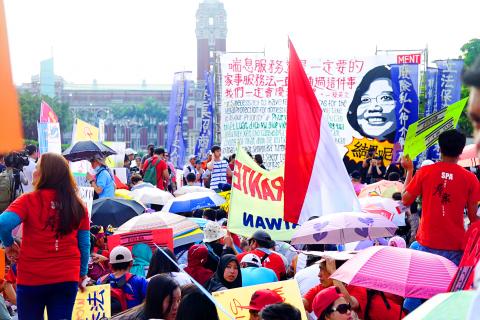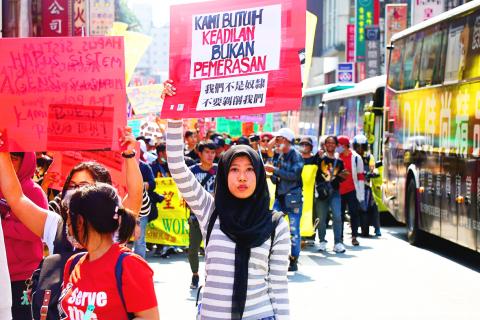Hundreds of migrant workers and members of labor rights groups yesterday took to the streets of Taipei on the eve of Workers’ Day to urge the government to amend the law to improve working conditions and labor rights for migrant workers.
Participants rallied in front of the Ministry of Labor at about noontime, calling on the ministry to meet three main demands, before setting off on a parade that ended on Ketagalan Boulevard in front of the Presidential Office Building.
The marchers held signs and banners in several languages, with messages such as “against the government being employer-friendly and using the system to suppress migrant workers,” “do not abuse, migrant workers are humans too” and “stop sweatshop migrant labor, fight for equal labor rights.”

Photo: CNA
The parade organizer, the Taiwan International Workers’ Association (TIWA), said it has been 25 years since migrant workers were first allowed in Taiwan, but government regulations have worsened and had thrown the employer-employee relationship off balance for the sake of easier management.
The protesters’ three main demands were: abolish the private employment brokerage system and enforce direct recruitment between nation; allow migrant workers to freely switch employers; and fight against the market-driven long-term care service system while protecting household workers’ rights through the Labor Standards Act (勞動基準法).
“We never asked a local worker to pay a brokerage fee of NT$80,000 to NT$150,000 to get a job, so why do migrant workers have to endure such exploitation?” the Migrants Empowerment Network in Taiwan (MENT) said, urging the government to act as an intermediary to prevent exploitation of migrants.

Photo: CNA
“It is ridiculous that migrant workers can only resign if their employer agrees to it,” the TIWA said, urging lawmakers to amend Article 53 of the Employment Services Act (就業服務法).
Taiwan’s long-term care service system should be public, because allowing it to become privately run or market-driven will worsen labor conditions for local and migrant caregivers or household workers alike, TIWA said, adding that more than half of migrant household workers work year round, with no holidays.
A Vietnamese woman who has worked as a household caregiver for eight years said she had to work long hours and be on stand-by nearly every day, without holidays.

Photo: Huang Yao-cheng, Taipei Times
She also said that she had to pay a large proportion of her salary to a manpower agency every month.
When the marchers reached Ketagelan Boulevard, they tossed paper planes carrying their “blood-sweat demands” toward the Presidential Office to symbolize their sending their voices to the president.
The Ministry of Labor issued a news release in the afternoon saying that it would “enhance current direct employment measures, re-examine the eligibility requirements for transferring between employers and try to implement respite care service for employers of migrant household workers to improve and protect their labor rights.”
The ministry said it has established a direct employment joint services center for employers to recruit migrant workers without having to use brokers and created an accreditation mechanism to evaluate recruitment agencies.
The success rate of transferring workers between employers is about 93.3 percent as of February, the mininstry said.
The ministry said that while not all household workers are included in the Labor Standards Act, it is working on providing for respite care service arrangements so that employers can apply for temporary respite care providers to help when their migrant workers have days off.

Taiwanese actress Barbie Hsu (徐熙媛) has died of pneumonia at the age of 48 while on a trip to Japan, where she contracted influenza during the Lunar New Year holiday, her sister confirmed today through an agent. "Our whole family came to Japan for a trip, and my dearest and most kindhearted sister Barbie Hsu died of influenza-induced pneumonia and unfortunately left us," Hsu's sister and talk show hostess Dee Hsu (徐熙娣) said. "I was grateful to be her sister in this life and that we got to care for and spend time with each other. I will always be grateful to

UNITED: The premier said Trump’s tariff comments provided a great opportunity for the private and public sectors to come together to maintain the nation’s chip advantage The government is considering ways to assist the nation’s semiconductor industry or hosting collaborative projects with the private sector after US President Donald Trump threatened to impose a 100 percent tariff on chips exported to the US, Premier Cho Jung-tai (卓榮泰) said yesterday. Trump on Monday told Republican members of the US Congress about plans to impose sweeping tariffs on semiconductors, steel, aluminum, copper and pharmaceuticals “in the very near future.” “It’s time for the United States to return to the system that made us richer and more powerful than ever before,” Trump said at the Republican Issues Conference in Miami, Florida. “They

REMINDER: Of the 6.78 million doses of flu vaccine Taiwan purchased for this flu season, about 200,000 are still available, an official said, following Big S’ death As news broke of the death of Taiwanese actress and singer Barbie Hsu (徐熙媛), also known as Big S (大S), from severe flu complications, the Centers for Disease Control (CDC) and doctors yesterday urged people at high risk to get vaccinated and be alert to signs of severe illness. Hsu’s family yesterday confirmed that the actress died on a family holiday in Japan due to pneumonia during the Lunar New Year holiday. CDC Deputy Director-General Tseng Shu-hui (曾淑慧) told an impromptu news conference that hospital visits for flu-like illnesses from Jan. 19 to Jan. 25 reached 162,352 — the highest

TAIWAN DEFENSE: The initiative would involve integrating various systems in a fast-paced manner through the use of common software to obstruct a Chinese invasion The first tranche of the US Navy’s “Replicator” initiative aimed at obstructing a Chinese invasion of Taiwan would be ready by August, a US Naval Institute (USNI) News report on Tuesday said. The initiative is part of a larger defense strategy for Taiwan, and would involve launching thousands of uncrewed submarines, surface vessels and aerial vehicles around Taiwan to buy the nation and its partners time to assemble a response. The plan was first made public by the Washington Post in June last year, when it cited comments by US Indo-Pacific Commander Admiral Samuel Paparo on the sidelines of the Shangri-La Dialogue